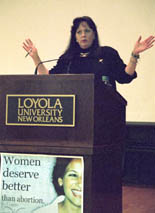Serrin Foster is against abortion. However, she said in a speech Tuesday night that her goal was not to condemn those who had an abortion in the past, or those who are in favor of abortion rights.
Students, faculty and community members filled Nunemaker Auditorium to hear Foster, president of Feminists for Life of America, outline “The Feminist Case Against Abortion.”
“It was the stories of all the women who have had abortions, or men who have been affected by them, that inspired me to take up this cause,” Foster said.
The talk was co-sponsored by Loyola Life, University Ministry, Residential Life, the Office of the President, the Jesuit Center, the Christian Legal Society, City College, the Student Government Association and the Women’s Resource Center.
Foster began her speech with a call to action.
“There are so many things we can do to promote the rights of women and children … I want to see some heavy lifting when you leave here tonight,” she said.
Foster said abortion was antithetical to the feminist cause, because it discriminates against a huge segment of society in a fundamental way and uses violence and force in dealing with problems rather than peaceful solutions. She added that domestic violence, rape, euthanasia and equality issues are all inextricably linked to the abortion debate.
“Feminism is about reducing the use of force to overpower and coerce each other,” she said.
Her analysis of feminism contradicting abortion included an extensive analysis of the first wave of feminism, which was anti-abortion. She brought up Mary Wollstonecraft, Elizabeth Cady Stanton and Lucrecia Mott, all of whom in the past have made strong arguments against abortion. According to Foster, Stanton described abortion as infanticide, and quoted her as saying, “It is degrading to women that we should treat our children as property to be disposed of as we see fit.”
Foster said that the anti-abortion’s view is varied and complex, with different factions envisioning different solutions to the problem.
“We’re all supposed to be in this one little box, but it’s not true,” she said.
According to Foster, Roe v. Wade – the Supreme Court decision upholding abortion as right-to-privacy – was not originally a feminist issue, and was made so by two men.
“Women were not running around the country saying ‘I want an abortion,'” Foster said. “They were concerned about their kids and going to PTA meetings.”
She said that Larry Leider, an anti-population growth activist, and Dr. Bernard Nathanson, a physician from Chicago who became an abortion-rights activist after seeing a botched abortion, made abortion a feminist issue by using the National Organization for Women to rally women around a previously unimportant issue.
“They claimed that 100,000 women died each year from unsafe abortions, but that simply wasn’t true – they made those numbers up. Don’t you think we would have noticed if 100,000 women were dying every year?” she said.
Foster said the best way to reduce abortion was to encourage social and economic support for pregnant women.
According to Foster, the support mechanisms should be in place in the workplace and in universities, and that pregnancy should not be a stigma, viewed as an obstacle to success.
“They say women can’t continue their education once they’re pregnant. Why are they stupid now, because they’re pregnant?” she said.
“Every 38 seconds, a woman in this country lays down her body, feeling that this is her only choice. Women should be demanding
better,” she said. “No woman should have to choose between sacrificing her ambitions and sacrificing her baby.”
When asked about contraception, she said that FFL takes no stand on the issue, preferring to address problems once women are pregnant.
“Some of us are for it, some of us oppose it for religious reasons, and some oppose it for health reasons, but that’s not really what we address,” she said.
Audience reaction was mixed. When asked who would help to organize around the cause and principles presented, about one-third of the people present raised their hand.
Courtney Thompson, graphic design junior, said the talk was a new perspective.
“It didn’t change my views on abortion, but it made me realize that more needs to be done to help women when they are facing difficult decisions,” she said.
Josie Feldman, psychology freshman, said the argument did not challenge the listeners enough.
“You need to have more that one perspective, otherwise you’re molding students to one viewpoint,” Feldman said.
Others enjoyed the content of the speech, but felt that certain elements were missing. Jonathan McGee, administrative assistant to the Jesuit Center, said that Foster did a good job overall, but he would have liked to hear more.
“She did a good job of showing how feminism was against abortion, but it was a bit lacking in philosophical argument,” McGee said.
Kelly Brown can be reached at [email protected].







